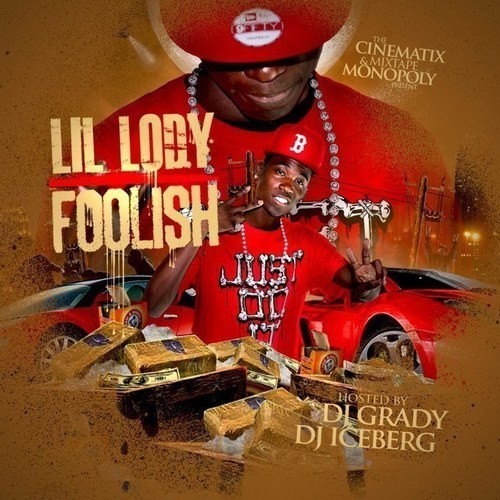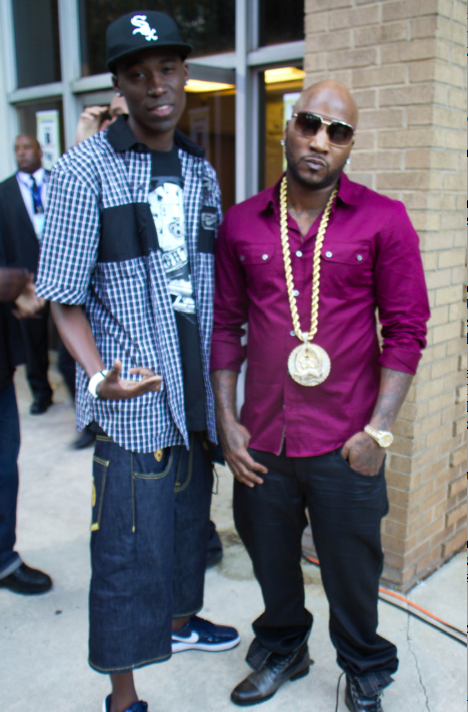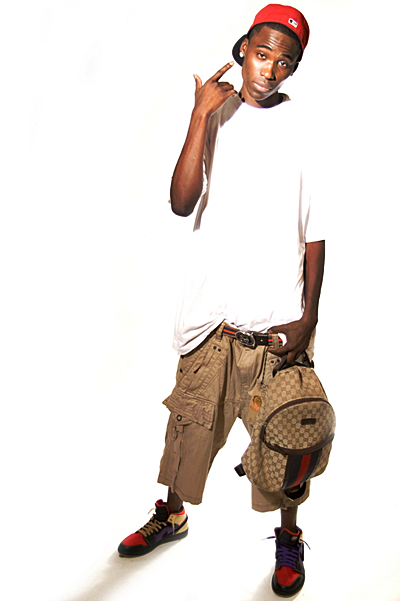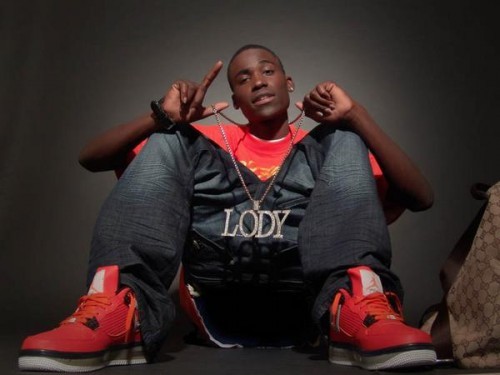
Hailing from the New Chicago neighborhood in North Memphis, 23-year-old rapper and producer Lil Lody has come a long way. In 2011, platinum-selling rap artist Young Jeezy snagged him to produce several songs on his album, Thug Motivation 103: Hustlerz Ambition. In addition to Young Jeezy, he’s also produced for Plies, Fabolous, Yo Gotti, Waka Flocka Flame, Rick Ross, and P. Diddy among others. As an artist, he’s released a hefty installment of mixtapes.
Lil Lody took time out to visit the Memphis Flyer headquarters to talk about his latest mixtape, Foolish, along with what artists he enjoys working with the most, the passing of his 10-year-old sister, being sued by Memphis rap heavyweights Project Pat and Juicy J., and much more. You can follow Lil Lody on Twitter: @LodyLucci.
Flyer: On your latest mixtape, Foolish, you touch on some personal topics primarily in the song “Foolish.” One of them is losing your 10-year-old sister a few years ago. Can you elaborate on this?
Lil Lody: It happened on December 28th, three days after Christmas. She was in a car wreck. She was on her way home from the skating rink in the car with some more people. As they were getting ready to turn, a police officer was coming fast down Jackson. He tried to hurry up and turn the lights on, but it was too late. They were in the turning lane. They had their turning signal on, and the police car just hit them. Boom! The car flipped multiple times. She flew out of the car. We couldn’t even find her.
By the time we did find her, she was still alive, but they said her brain was dead. She was pretty much gone when we got there. They tried to put her on machines and stuff, but she wasn’t responsive. It fucked me up mentally and physically. I’m past all of that. I feel like death is something that’s going to come. Nobody can run from it, and you can’t change it when a person dies.
In “Foolish,” you also mention being signed to D. Brady Entertainment, a record label founded by Project Pat and Juicy J, and subsequently being sued by them. How did that happen?
When I deal with people, I don’t deal with people on a business level. I deal with people on a more personal level first, then we can get into business. When I did the agreement with them [signing to D. Brady Entertainment], they promised me a lot of stuff. They told me, ‘You should sign with us. We’re going to do this for you. We’re going to get that.’
But when they brought me into the picture, it basically wasn’t that. They were just trying to use me to get beats. I kept telling them, ‘I’m a rapper. I was a rapper first.’ They were hearing me ,but they weren’t hearing me. They signed me as an artist. That’s what the contractual agreement was about. The beats didn’t have anything to do with it. They wanted me to be a rapper, come out with an album and all that. If you look in one of the albums’ artwork they put out during that time, you’ll see my name, ‘Coming soon, Lil Lody.’
I was seeing that they weren’t fucking with me, but I was still making moves. One day, I just called them and told them I wanted to get out of the contract. I told them, ‘I don’t feel like anything moved for me. Y’all are not keeping your promises. Y’all have breached the contract because y’all haven’t done anything that y’all said y’all were going to do. Y’all haven’t given me an advance. Y’all haven’t given me any money. Y’all haven’t done anything but bought a few beats from me.’ I was giving them, like, 10 to 15 beats for $1,500 to $2,000. I know that they’ll never tell you anything like that but I will. I can’t sugarcoat anything.

I ended up meeting [Young] Jeezy. We vibed off the rip. As soon as the “Ballin” song dropped, Def Jam gets a letter from D. Brady. I asked them why they’re suing me and they said basically because I was signed to them as an artist and they feel like they helped me blow up. I was only messing with Jeezy on a producer level. They had me signed as an artist.
I was trying to understand how they could do that. But really they had me locked all the way around where I couldn’t do anything like that without their permission. I fought the case. They were asking for $250,000 at first. My lawyers broke them down, and they couldn’t show any proof of where they gave me $250,000. They couldn’t show any proof that they gave me any advance or anything, so they had to end up settling for $50,000. I gave it to them to keep it moving with my career.
[Lil Lody signed a contract with D. Brady Entertainment. He was sued due to producing for outside artists without the company’s permission. A settlement for $50,000 resolved the matter. He also left the label.]
Since leaving the label, have you signed to anyone else or started your own label?
I’m unsigned right now, but I have a lot of deals on the table. Right now, I’m trying to be my own solo, standout artist. I don’t really want to sign to anybody that already has some other people. People would be saying, you got co-signed by such and such and that’s really the reason you’re on. Right now, I think I’m on the right track. My priorities are all straight. And right now, my name as an artist is getting where it’s supposed to get. That Foolish mixtape touched a lot of people, and I didn’t know it was going to do that.
Considering that you began as a rapper, what drove you to producing?
I started rapping and I was looking for producers to make me beats. Nobody could make the type of beats that I wanted. Everybody who I tried to spend money with tried to charge me a high price. The price wasn’t anything but their sound was whack. I was like ‘Fuck it. If I can do this, I can do that too, so I started making beats.’ It took me about two years to get it down. I’m not gonna say I was the best then. I was alright, but the more that you fuck with it, you’re gonna get better. It’s day by day.
What are some musical devices or instruments you enjoy using when you produce? And is there a certain approach that you take?
I started off with Fruity Loops. The next step was MPC 4,000, the MPC 3,000, the Phantom, Triton, Reason, Logic. I started messing with everything just trying to combine them all together and see what I could come up with. I like Fruity Loops the most [because] I like to move quick. Not saying that the other types of equipment are a waste of time, but they’re going to make you take longer. With Fruity Loops, I have all my stuff down-packed. I have all of my sounds. When I put in my beats, people know it’s me.

How long does it normally take you to produce a song?
It takes me 10 minutes to make a beat. I have to be zoned out or be in a certain type of mood some time. I might go a whole two weeks without making beats because I’m handling stuff that’s going on in real life. I got a really busy life. When I do get time out, whatever I’ve been doing is going to come out on that keyboard. Once I finish making beats, I play them to my homies. I ask them what they think. The beat has to go through five or six different people before I release it.
Who are your three favorite artists to work with when you’re producing?
Out of all the artists that I’ve worked with, my three favorites are [Young] Jeezy, [Yo] Gotti, and Plies. When I get in the studio around them, I can relate to them more than anybody else. We’re all hands on, and we all kind of act the same.
Who are some artists that you would like to work with in the future?
I would like to work with Dr. Dre., Snoop Dogg, Ice Cube. I like messing with the legends. I like to get in with them and see where their minds are at, because they can show me more with what I got going on with myself.
Nationally, you’re known more as a producer than an artist. Do you think it’s important to show people that you’re not just a talented producer but an artist as well?
It doesn’t really matter. They’re going to catch on sooner than later. A lot of people tell me, ‘You one of the hardest rappers-slash-producers that’s out.’ Not trying to compare me to Kanye or any of them, but a lot of people can’t do that. You have to have a real skill and talent to do that. Like Kanye, he’s dope at it. Dr. Dre was dope at it when he did The Chronic and all that.
In a lot of your music, you make reference to the street life. How was it for you to indulge in that type of lifestyle?
It was kind of cool. You get your money. The thing that I can say is when you’re playing in that field, it makes you really paranoid. You’re cautious of everything and everybody. It’s with certain stuff that you do, such as you watch how people talk on the phone. I still don’t answer my phone for anybody to this day. I don’t text that much. None of that. If I want to see somebody, I still speak to them face-to-face because of my past. A lot of stuff can mess you up, so you have to watch everything really close. The money comes really fast and it’s cool, but you have to pay attention because the wrong move can mess you off.

How was your upbringing?
My mom and dad always spoiled me. Whatever I wanted, they always spoiled me. My daddy, he lived the fly life — had cars everywhere, houses, and all that. But he ended up getting busted and going to jail. A lot of that came on to me. Whatever was left over came on to me, and it was up to me to continue what was going on. I knew that at some point in my life, I was going to have to stop what I was doing before it got too late. I had to transfer and do something the right way to keep the money coming in.
How is your view on religion? Were you raised in a religious household?
I believe in God. You gotta pray for every dollar that you make. Keep your head up and believe in God. My family wasn’t just real Christian, go to church every Sunday, and all of that. I can’t act like I go to church every Sunday. I can’t remember the last time I went to church, but I heard if you pray, it’ll work. I pray a lot.
What’s up next?
I got another mixtape coming out in September. I feel like I got the game right now nationally. Foolish touched the people so much, and it’s like they’re addicted right now. I’m also working on Plies’ “Purple Heart” album. That’s fixing to come out. It’s going to be crazy. I did a few of the songs. I’m working with Young Scooter. I did the Colombia track for him. I didn’t put my signature. That’s how I’m starting to mess everybody up.

